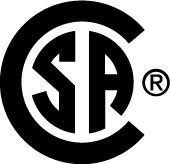Advisory - When purchasing smoke or carbon monoxide alarms, look for a Canadian certification mark Français
OTTAWA, ON, May 12, 2021 /CNW/ -
Summary
Products: Various smoke or carbon monoxide alarms for home.
Issue: Uncertified smoke or carbon monoxide alarms may not meet Canadian performance standards and may fail to operate properly, posing a health or safety risk to Canadians.
What to do: Immediately replace alarms with ones that bear a recognized Canadian certification mark.






Issue
Health Canada is reminding Canadians to check for a recognized Canadian certification mark on the product when purchasing smoke or carbon monoxide (CO) alarms online or in-store. Products that do not have a recognized Canadian certification mark may not meet Canadian performance standards and could fail or operate incorrectly. This could pose a risk to consumers who may not be alerted to a fire or CO incident in their home.
In Canada, all electrical products that connect to home wiring or an outlet must be certified to Canadian standards. This includes both hardwired and battery operated smoke and CO alarms. Canadian certification marks indicate that these products have been assessed by laboratories accredited by the Standards Council of Canada and that the products meet national standards.
To follow public health restrictions and help reduce the spread of COVID-19, Canadians are shopping online more often. While online shopping has been one way to stay safe, Canadians should be aware that there are also potential risks with purchasing certain products online.
When purchasing a smoke or CO alarm, look for a recognized Canadian certification mark such as CSA, cUL, ULC or cETL, which should appear directly on the product -- not just the packaging. If the certification information is not available on the product website, ask the seller to confirm that the product is certified to Canadian standards and that it bears a Canadian certification mark before you buy the product. If you feel unsure, do not take the risk of purchasing these products.
It is important to know from whom you are buying, and make sure the seller provides their contact details in case you have questions. Be aware that common Canadian online sales platforms may offer access to products sold by third-party sellers that do not operate in Canada and it may be more difficult to follow up with these sellers. Make sure to check if the consumer products have been recalled for health or safety reasons.
Canadians are encouraged to report any health or safety incidents related to the use of these products or any other consumer product or cosmetic by filling out the Consumer Product Incident Report Form.
What you should do
- Immediately replace any smoke and CO alarms in your home that do not bear a Canadian certification mark, and replace them with ones that do, such as CSA, cUL, ULC or cETL.
- Dispose of the products according to the waste requirements for electronic products in your municipality.
- When purchasing a smoke or CO alarm, make sure the device bears a recognized Canadian certification mark directly on the product, not just the packaging.
See some common Canadian certification mark examples you may find on smoke and CO alarms above.
- Follow the manufacturer's directions for installation, maintenance, testing and replacement of the alarm.
- Familiarize yourself with the instruction manual and the features of your alarm to ensure you can hear and recognize the sound of the alarm.
- Remember to test your alarms regularly, and for battery-powered products, follow the manufacturer's instructions for battery replacement.
Find more information on Health Canada's website about smoke and CO alarms and fire safety in your home, CO poisoning, and buying consumer products online.
SOURCE Health Canada

Media enquiries: Health Canada, (613) 957-2983, [email protected] ; Public enquiries: (613) 957-2991, 1-866 225-0709, [email protected]

Share this article